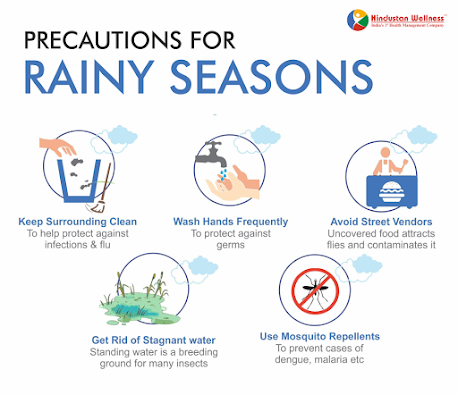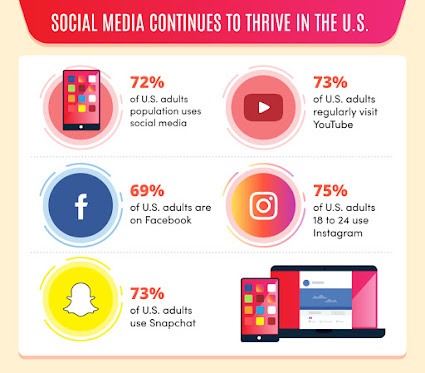Rainy season Disease season -
In the rainy season, after the rains and floods, there is a strong fear of the spread of various diseases which can take the form of epidemics. In order to control these diseases, it is very important to follow simple and safe measures. Flood Diseases Waterborne Diseases, Malaria, Eye Diseases, Skin Diseases Infectious diseases the germs of various diseases are found in dirty water. Drinking or using contaminated water mostly causes gastrointestinal diseases like cholera, periodic fever, dysentery, diarrhea, indigestion, stomach worms etc.
The
following precautions must be taken to prevent these diseases.
1. Use clean drinking water and, if possible,
use boiled water for drinking and cooking during epidemics.
2. Avoid eating rotten fruits and raw
vegetables. Wash fruits and vegetables thoroughly.
3. Cover food and beverages well to protect
them from flies, as flies play an important role in moving the germs of various
diseases from one place to another.
4. Wash your hands thoroughly with soap and
clean water before cooking. Dirty hands can cause illness.
5. In case of diarrhea, give salt to children
and continue other foods. Salt can also be given to adults.
6. In the days of the plague, everyone should
be vaccinated against diseases.
Treatment of malaria
Malaria fever is caused by a bacterium that enters the bloodstream of a healthy person through a mosquito bite and causes the disease.
After rains and floods, dirty water
accumulates in the form of ponds and ponds. Mosquitoes thrive easily in such
places. These mosquitoes bite people while they are asleep or awake and cause
malaria fever. Avoid it. For this purpose, close the ponds and ponds of dirty
water around your surroundings by adding lime or soil so that mosquitoes cannot
breed in these places. Cover yourself to avoid mosquitoes while sleeping at
night. Use a mosquito net if possible. Spray mosquito repellent in your home.
In case of malaria fever, use the medicine as advised by the doctor. Take a
full course of medicine to completely eliminate the malaria virus from the
body.
Eye diseases
and treatment
Rainfall and flooding are likely to increase
the risk of eye diseases due to air humidity and sunburn.
There may be a risk of eye ulcers ranging
from eye soreness. There may be eye swelling, irritation and watery eyes. To
avoid all these, it is very important to follow the following precautions.
Children should be strictly forbidden to bathe in rain and dirty water of ponds
and ponds. Eyes should be washed with clean water several times a day. Consult
a doctor if you develop eye problems
Skin
diseases and treatments
There is a high risk of spreading boils and
scabies in flood and rain-hit areas. To avoid skin diseases, follow the
following precautions. People of all ages should take special care of body
hygiene. Clean young children. Keep clean and rinse with clean water.
In case of itching disease, other healthy people's items should not be used in the house. In case of itching, itching should be avoided as the germs are transmitted to the wounds caused by itching and tIntensity and protection of.
heat in
rainy season
In the months of July and August, the
intensity of heat and the contrast of the sun increase. It is so hot that
everyone walks away from Al-Aman and Al-Hafeez. When it gets too hot, the human
skin acts as an air conditioner and sweating makes a person feel somewhat
relaxed and cool.
Excessive heat and sun exposure can lead to
sunburn or heatstroke, which, if not treated immediately, can lead to death. Die
sake the form of abscesses. In this condition, the sweat does not come at all.
The temperature reaches 106 degrees Fahrenheit, the skin becomes completely
dry. In such a condition, the patient is immediately taken to a cool place and
massaged on the arms and legs with cold bandages and the patient should be
rushed to the hospital.
In addition to sunstroke, excessive sweating
in extreme heat can lead to severe dehydration and dehydration. In this
condition, there is severe pain in the abdomen and legs and a very weak
feeling. If they are discharged, then the servant becomes half dead in this
condition. Even in this condition, immediate medical aid is required. In such a
condition, the deficiency of water and salts is immediately removed by drip.
Protect from
heat
Follow these tips to avoid the effects of heat stroke and sun stroke:
1. Don't go out unnecessarily in the heat,
especially during the day.
2. When going out, be sure to keep a cloth or
towel on your head. Wet the cloth from time to time and keep it on your head.
3. Make maximum use of water and salt before
going out and coming home.
4. Cold drinks do not help to quench your
thirst on hot days. ۔
5. Use water and other beverages as much as
possible on hot days. Heavy foods should be avoided on these days.
6. Diarrhea is very common in hot days. When
two or more thin stools appear in a day, it is called diarrhea. Die of
deficiency.























